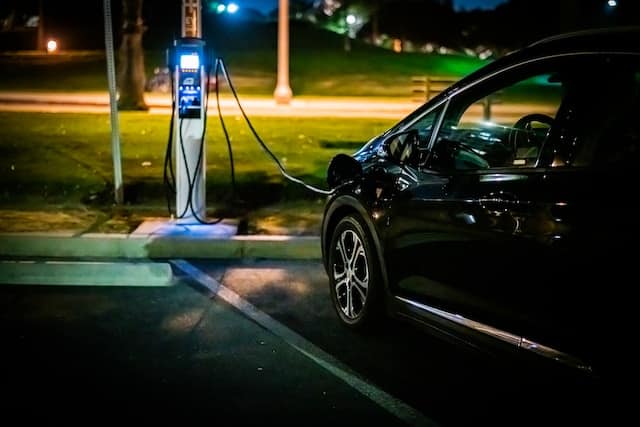The automotive industry has long been associated with carbon emissions, contributing significantly to global environmental challenges. As societies worldwide embrace sustainable practices, the need to offset carbon emissions has become crucial. Here, blockchain technology can bring transformation not only to the automotive industry but also to the way we approach carbon offsetting. In this blog, we’ll explore how blockchain application development is streamlining the carbon offsetting process in the automotive sector, paving the way for a greener and more accountable future.
Blockchain’s Impact on Carbon Offsetting
Blockchain’s transformative impact on the automotive industry’s carbon-offsetting efforts cannot be understated. The technology is redefining carbon offset initiative management by leveraging its inherent features of transparency, security, and automation.
The automotive industry holds significant potential for carbon reduction through the application of blockchain technology. Here’s how blockchain can specifically assist the industry in this endeavor:
Transparency in Carbon Offsetting Process
The automotive supply chain is complex and often spans multiple suppliers and regions. Blockchain’s inherent transparency and immutability offer a solution to one of the major challenges in carbon offsetting – trust and accountability. It can provide an immutable record of every step in the supply chain, from raw materials to final assembly.
This transparency enables manufacturers to track the carbon footprint of each component. Stakeholders across the automotive supply chain can access real-time data about emission reductions. Thus, it promotes responsible sourcing and reduces emissions associated with supply chain inefficiencies.
Incentivizing Efficient Driving
Blockchain-powered platforms can reward drivers for adopting eco-friendly driving behaviors. Businesses can utilize such platforms for recording driving patterns. They can offer tokens or incentives to vehicle owners for low-emission driving.
Smart contracts on the blockchain enable automatic rewards for drivers who exhibit eco-friendly behaviors. They translate carbon reductions into tangible benefits such as tokens, discounts, or credits.
This approach empowers drivers to make environmentally conscious choices. Additionally, it fosters a culture of sustainable driving.
With blockchain’s peer-to-peer verification, data privacy features, and potential for gamification, a dynamic ecosystem can emerge, encouraging drivers to actively participate in carbon reduction efforts while contributing to a greener automotive landscape.
Thus, blockchain encourages a more sustainable approach to mobility and further reduces carbon emissions.

Smart Charging and Grid Integration
Smart charging involves adjusting the timing and rate of electric vehicle (EV) charging. It is based on various factors, including electricity demand, pricing, and the availability of renewable energy sources like solar power.
Blockchain can act as a secure and transparent platform to manage and record these adjustments. Manufacturers can connect their automobiles to the blockchain. It will facilitate data sharing about charging preferences, energy prices, and grid conditions in a decentralized manner.
Additionally, firms can connect EVs to the grid through blockchain technology. Blockchain enables these vehicles to communicate with the grid to balance electricity supply and demand. This communication by blockchain improves the stability and reliability of the grid.
By utilizing renewable energy sources and optimizing charging patterns, smart charging contributes to lower carbon emissions by minimizing the use of fossil fuels for electricity generation.
Emission Data Tracking
Vehicles generate emissions throughout their lifecycle, even when they do not operate. From manufacturing to disposal, automobiles produce some amount of emissions.
Businesses can utilize blockchain technology to create a comprehensive lifecycle assessment. The distributed ledger can securely record emissions data at every stage. This data-driven approach empowers manufacturers to identify emission hotspots and implement targeted strategies to reduce carbon impact.
Shared Mobility and Ownership
Blockchain can underpin shared mobility services by providing a secure and decentralized way to manage vehicle access and usage. Shared electric vehicles can be optimally distributed, charged, and maintained, contributing to overall carbon reduction by promoting efficient vehicle utilization.
Moreover, blockchain’s integration with charging infrastructure prioritizes renewable energy sources, reducing the carbon footprint of shared EVs. It offers a sustainable and environmentally friendly transportation solution.
Collaborative Initiatives and Industry Partnerships
Blockchain’s collaborative nature enables different players within the automotive ecosystem, from manufacturers to suppliers, to participate in shared carbon offset projects. Immutable records on the blockchain ensure that every contribution is acknowledged and properly attributed. It drives industry-wise efforts to reduce emissions.
Automation with Smart Contracts
Smart contracts play a pivotal role in automating the carbon offsetting process. These self-executing contracts ensure automatic transactions after fulfillment of predefined criteria. They eliminate the need for intermediaries, reduce administrative overhead, and expedite the offsetting process.
Conclusion
Blockchain’s transformative impact on the automotive industry extends beyond revolutionizing supply chains and enhancing efficiency. It’s now playing a pivotal role in streamlining the carbon offsetting process, allowing for transparent verification, automation, and real-time monitoring.
As the automotive sector seeks to adopt sustainable practices, blockchain provides the tools needed to combat carbon emissions and drive the industry toward a greener future.
Interested in integrating blockchain technology into your automotive business? Connect with our blockchain developers to discuss your project requirements.














Leave a Reply